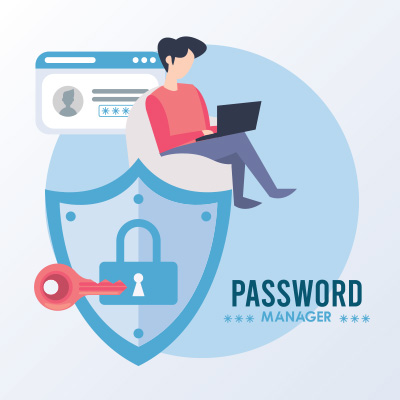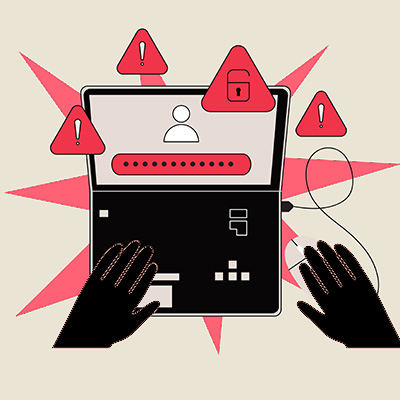Business technology is known to be remarkably finicky, particularly if you do not have the requisite knowledge to manage and maintain it. After all, there is a reason why you hire an IT department or a managed service provider to handle this role. What happens if your technology fails, though? Do you have a plan in place? What does a plan like this even look like, anyway? Let’s dig into the details.
Passwords are the keys to digital access, but they’re often not treated as keys; meaning they aren’t always protected by their users. Unfortunately, people don’t always do everything they can to protect their passwords and there are a lot more scammers out there than pickpockets. Effective password management is crucial for any business. It works to maintain the security of online accounts and sensitive information. Here are five ways to control and enhance your password management. Use Strong and Unique Passwords Create strong passwords that include a mix of uppercase and lowercase letters, numbers, and special characters. You’ll want to avoid using easily guessable information such as birthdays, names, or common words while also making sure that each of your passwords is unique for different accounts to prevent a security breach in one account from affecting others. Implement a Password Manager The password manager is a great tool to let users generate, store, and organize complex passwords for each of their accounts. The best thing about them is that they promote the use of complex and unique passwords for each site, reducing the temptation to reuse passwords across multiple platforms, and improving data security. Additionally, many password managers also offer features like secure password sharing and auditing tools to ensure passwords meet certain security criteria. Enable Multi-Factor Authentication IT administrators and users will want to enable multi-factor authentication (MFA) whenever possible. This option adds an extra layer of security by requiring a second form of verification, such as a code sent to your mobile device or generated by an app. MFA ensures that even if a password is thought to be compromised, the unauthorized party wouldn’t be able to access the digital resources beyond the MFA-protected account Regularly Update and Change Passwords Passwords are the major tool used to protect organizational and personal data. In order to do that, you have to make sure they don’t get stale. Set a schedule to update your passwords regularly, especially for critical accounts. If you find out a service you use has been compromised, you need to make sure to change the password immediately. Educate Yourself and Stay Informed It’s a good practice to stay informed about the latest cybersecurity threats such as advancements to phishing attacks or other scams that are going around. Everyone should be cautious of malicious websites and questionable correspondence that may try to trick you into revealing your login credentials or getting you to interact with files that deploy malicious code. Remember, the goal is to create a robust defense against unauthorized access. By working toward more secure strategies, your organization can be much more secure. If you would like to learn more about how White Mountain IT Services can augment your organization’s data security efforts, contact us today at (603) 889-0800.
Yes, Ransomware is Common Enough to Warrant This Measure Ransomware infections, according to recent surveys, have affected three out of four professional organizations in some capacity over the past year. That?s a huge portion of businesses, and it?s no laughing matter. You need to protect yourself in any way you can. Ransomware can have various negative effects on your business, such as the following: Ransomware impacts productivity in at least some capacity Ransomware can lock down your data or steal it before encrypting it. Your data can be sold on the Dark Web where hackers can have a field day with it. You could be left with encrypted data if you fail to pay the ransom. This doesn?t mean to pay it though, as it could still happen even if you do pay the ransom. Your business? reputation could suffer due to a cybersecurity failure such as a ransomware attack, leading to fewer clients and business partners. Your budget could take a hit from regulatory bodies imposing fines and other penalties. A zero-trust policy can significantly improve your likelihood of never encountering these circumstances. Zero-Trust Leverages the Principle of Least Privilege Imagine that your company has multiple security checks in place to ensure that no individual accesses anything they are not supposed to without first authenticating their identity. This is what zero trust entails; it means you have complete and total control over who accesses what, when, and how, and you can see at a glance who performs what actions based on access logs. You can restrict access per individual or per role, ensuring that your systems are only accessible by those who are authorized and those who need access to do their jobs. It?s easy to see how this framework can be applied to ransomware and other security threats to your business. It could potentially prevent an infection before it has a chance to really latch onto your system, or at least limit infections so that they can be promptly addressed and eradicated. White Mountain IT Services Can Build Your Zero-Trust Policy For You At White Mountain IT Services, we take pride in our security solutions and protecting our clients. Let us help you build the best protections against modern-day security threats. Reach out to us today at (603) 889-0800 to get started.
Let?s discuss the different perspectives to take into account as you establish your RTO and RPO standards.
So, what is the SLAM method? The SLAM Method is a Simple Practice to Help Spot Phishing The SLAM method is a framework to help keep phishing prevention practices in mind.







